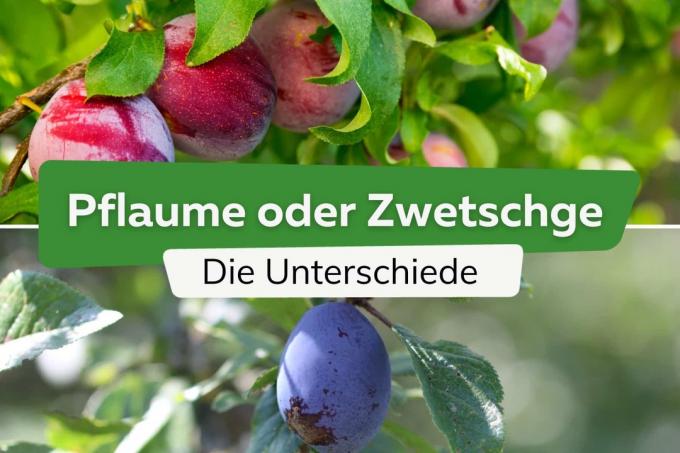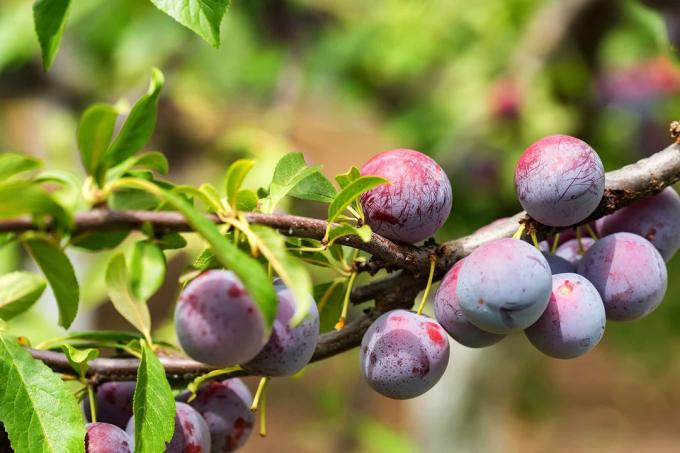
Plum or plum? The blue fruits with the small stone in the middle are often referred to as plums. However, there are differences here, because if the fruits have an oval shape and are firmer, then they are plums. You can read about exactly where the differences lie here.
To the point
- Plums are botanically classified as plums
- This also includes Reneclodes and mirabelle plums
- Plum genus belongs to the rose family (Rosaceae
- Plums tend to be round, plums are oval
- Plums are sweeter and juicier than damsons
Table of contents
- Growth and appearance of plums
- Growth and appearance of the plum
- The taste
- Different types of plums
- Different varieties of plums
- frequently asked Questions
Growth and appearance of plums
The tree usually grows with a narrow crown. The bark is gray-brown and smooth. The plants grow between six and ten meters high. It is one of the most popular Fruit trees for the garden.

Characteristics:
- Leaves dark green above and light green below
- epileptic and notched
- Blossoms in April
- white to greenish and bushy
- Plums are hermaphrodites
- Drupes dark blue to black
- with yellow flesh
- about four to eight centimeters tall
- Maturity between August and October
The plum tree needs a warm and sunny location with humus-rich, nutrient-rich and slightly moist soil in order to thrive and provide a rich harvest.
Growth and appearance of the plum
The plum tree grows very strongly, especially in the first few years, before its vigor decreases as it grows older. The leading branches grow vertically upwards. The crown is rounded to pyramidal and wide. The plum tree grows between four and eight meters high.

Characteristics:
- broad, egg-shaped leaves
- white flowers in May
- arranged in clusters
- can be both hermaphroditic and require a second tree nearby
- round and large fruits in midsummer
- Depending on the variety, plums are yellow or blue
- the flesh is always yellow
The location of the plum tree should be sunny, warm and protected from the wind. The soil is ideally humus, nutrient-rich and always slightly moist.
The taste
While the flesh of the plums is a little firmer, the stone is easy to remove. The pit usually remains attached to the juicy flesh of the plum.

The two fruits also have different tastes:
- Plums are sweeter
- Plums are usually slightly sour
- both vary from variety to variety
Different types of plums
There are many different types of plums, not only divided into plums, renecludes and mirabelle plums.
There are early to late varieties of plums:
| Early varieties | Medium early varieties | Late varieties | Very late varieties |
|---|---|---|---|
| Ontario | Count Althan's Reneclude | Ortenauer | Anna Spaeth |
| Oullin's Reneclude | Stanley | Pumpkin plum | |
| Beauty from Lions | Big green reindeer clod | ||
| The Czar | Metz Mirabelle | ||
| Nancy Mirabelle |
Different varieties of plums
There are also different varieties of plums, where the fruits can differ primarily in taste and size.
Plums are divided into early, mid-early, late and very late varieties:
| Early varieties | Medium early varieties | Late varieties | Very late varieties |
|---|---|---|---|
| Zimmer's early plum | Bühler early plum | Italian plum Fellenberg | House plum |
| Lützelsachser early plum | Wagenheim's early plum | ||
| Ersinger early plum |
frequently asked Questions
If you want to bake a classic plum cake, then plums are better suited for this, as our grandparents already knew. Because the fruit is firmer and the cake is less mushy. Since they have a sour taste, it is helpful to add sugar to the fruit on the cake after baking.
Of course, the round and sweet plums can also be used for various dishes. In general, those that are boiled are ideal for juicy plums. These include sweet jam and plum jam as well as the somewhat heartier chutney. Plums, on the other hand, are often dried into prune or used as baked plums.
Both fruits have a very high proportion of vitamin B. Therefore, both varieties are very healthy fruits. The only deciding factor here is your own personal taste as to whether you prefer a plum or a plum.
These are different types of plums. Mirabelles are the smallest fruits and when ripe they are very sweet and always yellow. Reneclodes are an intermediate variety between the small, round mirabelle plums and the large, round plums. They also have a very sweet taste and are smaller than plums but larger than mirabelle plums. All three varieties are suitable for immediate consumption due to their sweetness and juiciness.



